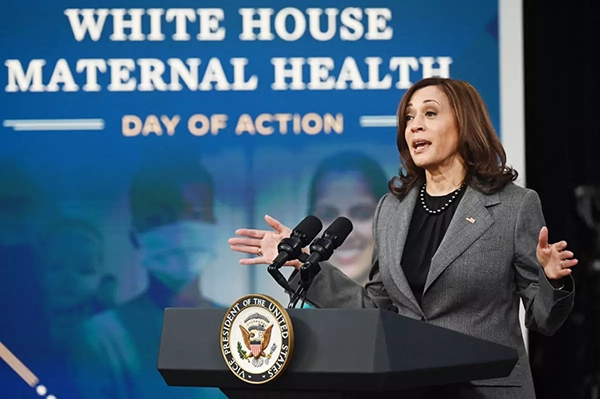Why Kamala Harris is Prioritizing Black Maternal Health in Her Agenda
Vice President Kamala Harris is the first vice president to tackle Black maternal health, and she believes more politicians and policy makers need to be addressing this issue.
According to the Centers for Disease Control, Black women in the U.S. are nearly three times more likely to die during pregnancy or delivery than any other race, a fact that Vice President Harris reiterated from the stage at the 2024 ESSENCE Festival of Music and Culture.
“And we know that there are a variety of reasons for that,” Vice President Harris said. “But we also know that this is a health care crisis of the highest order that has received very little attention proportionate to the seriousness of the matter.”
Why are Black maternal mortality rates high?
As Vice President Harris stated, multiple factors contribute to the high Black maternal mortality rates that are seen in states across the country, especially Southern states such as Arkansas, Mississippi, Tennessee, Alabama and Louisiana.
“The majority of Black women in America live in the South,” Vice President Harris shared. “And we have some of the highest rates of Black maternal mortality in the South.”
Lack of access to quality and affordable health and limited postpartum care are two possible contributing factors.
Furthermore, several health conditions that disproportionately affect Black mothers can increase maternal mortality risk, including chronic heart disease, hypertension, obesity, and diabetes.
However, even healthy Black women — such as decorated U.S. Olympic sprinter Tori Bowie — can die from complications of childbirth.
Systemic discrimination and implicit bias must also be addressed. Many Black women purport that their concerns are not taken seriously by their health care professionals.
What can be done to reduce Black maternal mortality rates?
At the ESSENCE Festival of Music and Culture Fortunately, Vice President Harris highlighted her efforts to extend Medicaid postpartum coverage. Historically, states have only been required to offer mothers Medicaid coverage for 2 months postpartum. In December 2021, Vice President Harris called on states to extend their postpartum coverage to a full year. Since then, 46 states, plus D.C. and the U.S. Virgin Islands, have extended coverage up to 12 months.
Vice President Harris address Black maternal health at the 19:55 mark on the video
Fortunately, Vice President Harris isn’t the only person in a position of power who is sounding the alarm on the issue of Black maternal mortality rates.
The Black Maternal Momnibus Act of 2021, introduced by Congress to address the issue, includes 13 separate actions to help Black mothers. The initiatives address housing and transportation and also include programs for digital tools that may improve health outcomes in underserved communities.
CDC’s Hear Her Campaign urges the family and friends of women who are pregnant and recently postpartum to be advocates. The program also seeks to raise awareness of serious pregnancy-related complications and their warning signs and improve communication between pregnant and postpartum patients and their healthcare providers.
Organizations such as the American Heart Association (AHA) and the National Institutes of Health (NIH) are conducting research to learn more about maternal mortality risk factors.
Meanwhile, it’s important for Black women to be their own advocates too. Learn what urgent maternal warning signs you should watch out for and when to seek medical help.
Here are some resources on Black Maternal Health to explore:
- Black Mamas Matter Alliance (BMMA)
- CDC Hear Her campaign
- Let’s talk PPCM (Peripartum Cardiomyopathy)
- National Birth Equity Collaborative
- Preeclampsia.org
- Peripartum Cardiomyopathy Registry
- We Are the Faces of Black Maternal Health
Learn more about the White House Blueprint for Addressing the Maternal Health Crisis.




